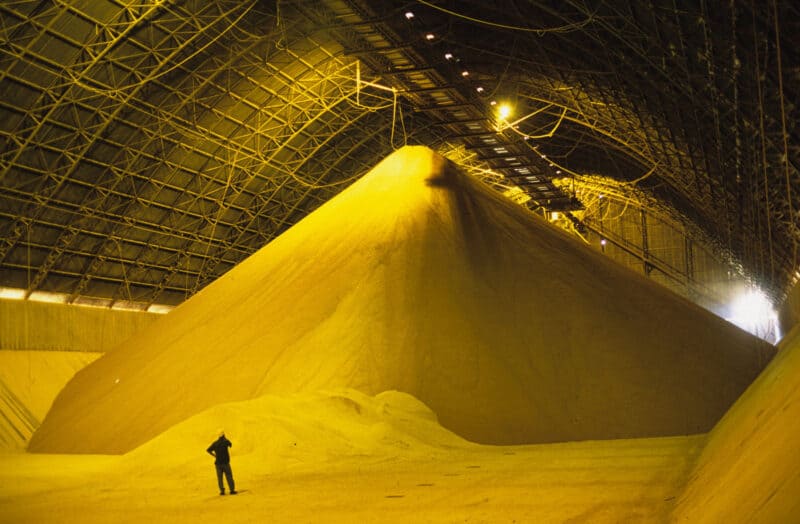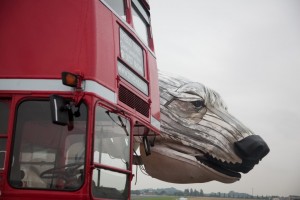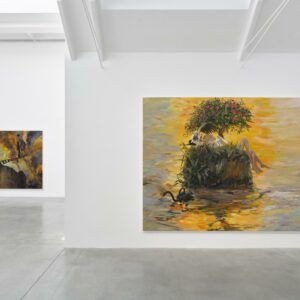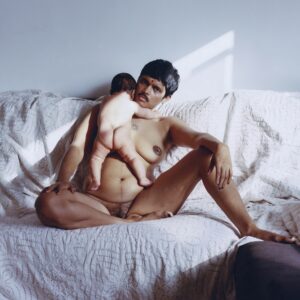A virtual, female pig has appeared on top of Barclays’ Canary Wharf HQ, two Tesco stores in London and Liverpool, DEFRA and other locations in a new experimental augmented reality (AR) app created by artists, Naho Matsuda and collective A Drift of Us.
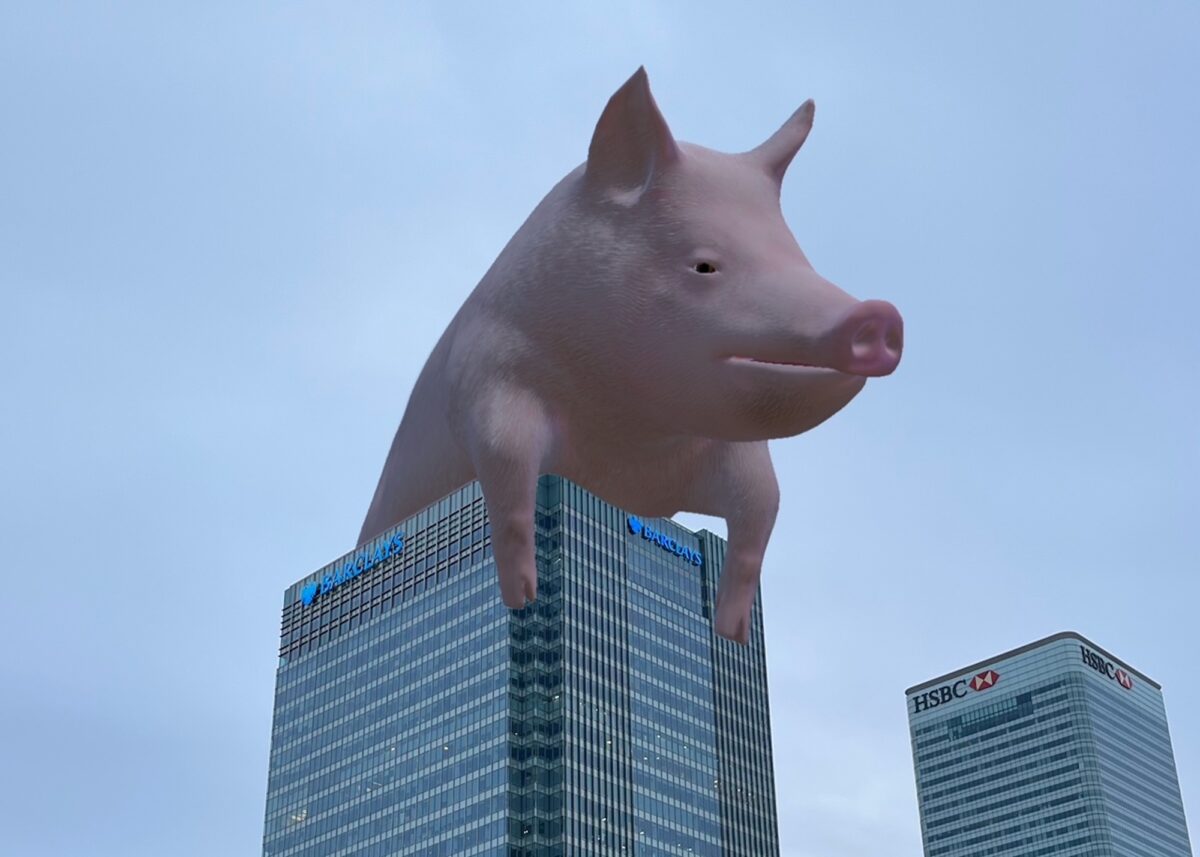
SOW AR, which is free to download via the Apple Store or Google Play, has been created as a symbol of protest and resistance, exposing companies and the government’s links to industrial meat production. The project has been supported by Greenpeace UK as part of the NGO’s Bad Taste project.
Taking the form of a digital sculpture, SOW AR invites the public to visualise the connections between our industrial food system and the destruction of climate and the natural world. While using the app on a smartphone the public can expect to encounter the huge, sometimes sleeping, sometimes huffing, twitching or squealing female pig.
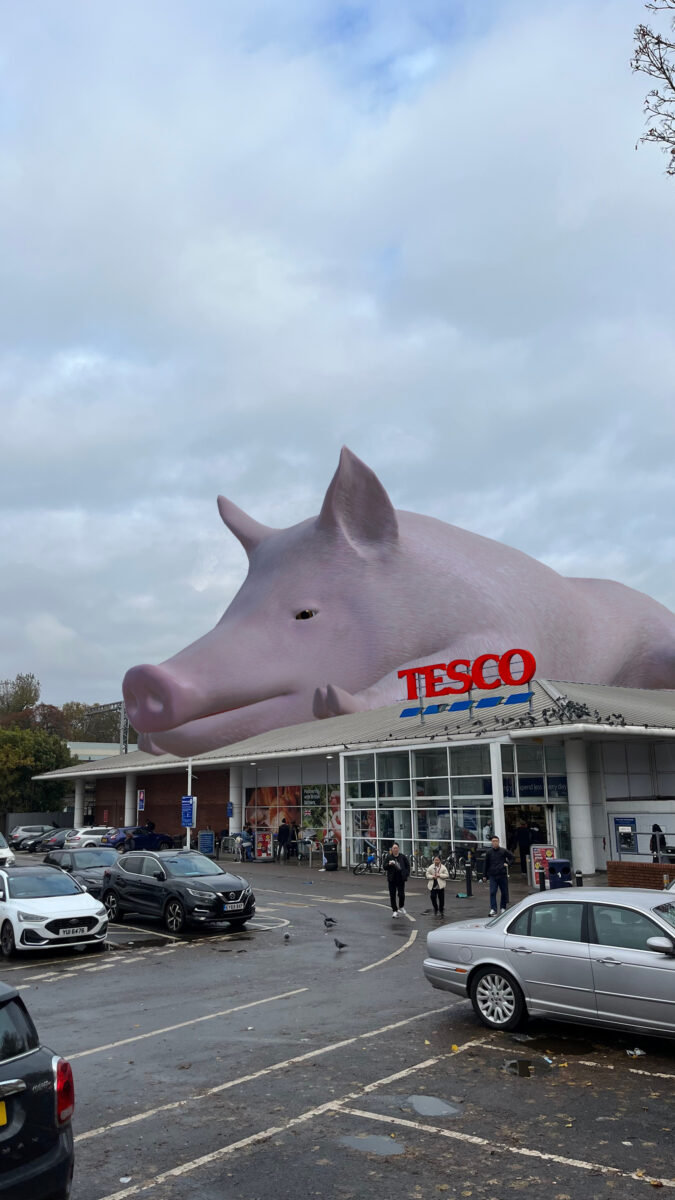
SOW can be seen watching and weighing down on the buildings of some of the UK’s biggest corporate and government actors in our industrial food system. Barclays financed the world’s biggest meat company and notorious forest destroyer, JBS, to the tune of £4.8 billion between 2015 and 2022, Tesco refuses to drop JBS as a supplier, and the government has failed to prevent deforestation-linked products from entering the UK. Meanwhile, JBS is planning to list shares on the New York Stock Exchange, which would give the company access to more money to further expand.
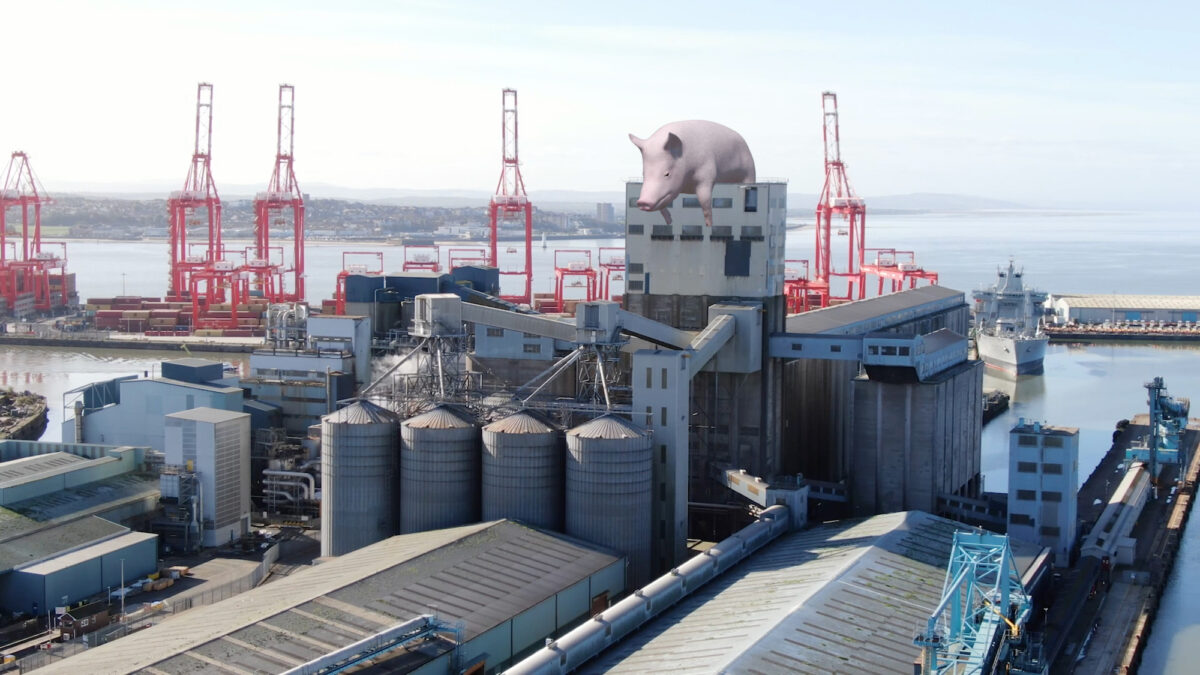
SOW can also be found at animal feed supplier Cargill’s soya plant in Liverpool, and at a newly opened Danish Crown plant in Rochdale, Greater Manchester, where Europe’s biggest pork producer will process cheaper and solely imported pork from Denmark.
The project builds upon a rise in the use of AR in contemporary art in public space. These include works such as Nancy Baker Cathill’s, “State Property” (2023), an exploding uterus floating above the Supreme Court, and a protest artwork addressing the evisceration of abortion rights in the US. Similarly, SOW AR is used to captivate audiences and incite meaningful dialogue, encouraging the public to playfully engage with and question the world around them.
The artists are experimenting with the rules and possibilities of AR, moving beyond traditional brand subvertising techniques within this new digital medium. Once downloaded, the user’s smartphone camera turns into a director lens in the app, encouraging people to record the digital sculpture in a changed reality.
Artist Naho Matsuda said:
SOW is a female breeding pig, she’s monstrous and beautiful at the same time. But similar to the industrial meat industry, SOW is only visible if you choose to look.
Working with visual artist Luigi Honorat, [3] we have created SOW AR, a digital sculpture that identifies the key players in the violent and exploitative supply chain of industrial meat, and especially pork, production.
We hope people will travel to see SOW in the places we’ve identified. It becomes a bit of an adventure to visit these sites since some of the locations are inconvenient to get to and may appear anonymous, sitting on large industrial estates not designed for visitors.
AR technology is rapidly evolving and offers new and experimental ways to share art in an ephemeral but powerful way. We hope SOW helps viewers to visualise the invisible structures in their everyday lives and to imagine a world where power is divided differently.
The artists’ virtually disruptive app highlights how all of the institutions featured are complicit in the destruction of climate-critical ecosystems like the Amazon rainforest, which is not only decimating unique and important wildlife species, it’s forcing Indigenous communities off land they have owned for centuries. The global industrial food system is also impacting nature, our health and the cost of living here in the UK.
Earlier this month, the UN reported the worldwide cost to health and the environment caused by industrial food production to be £8tn a year. FAO-OECD’s latest projections also reveal global poultry consumption is set to increase by 15%, pork by 11%, and beef by 10% by 2032. A new report from McKinsey also warned that up to 80 million hectares of additional land, equivalent to all of Brazil’s cropland by 2030, would be needed for the world to meet the projected demand for food, animal feed and fuel.
Daniela Montalto, Greenpeace UK forests campaigner, said:
Stopping climate and nature breakdown demands transformative changes to our food system. SOW AR is an inventive way of making this connection explicit, showing that only by cutting our meat production and consumption will we free up enough cropland to feed people first, reduce livestock emissions and create more space for nature.
Industrial meat companies, UK banks financing them, and supermarkets whose supply chains are driving the destruction of critical ecosystems, must be government-regulated, forcing them to align with international goals for climate and nature protection.
The government must also support UK farmers to transition to climate-, people- and nature-friendly farming. Meanwhile, imports of soya and other animal feed crops that drive deforestation must be banned and the 10 million tonnes of annual UK food waste must be reduced, with what’s left used as animal feed.
Download SOW AR App Apple Store & Google Play.
Visit sow-project.com for more information.
About the artists
Naho Matsuda is a visual artist based in London. Her practice is socially-engaged and situated, often involving local people, public places and the natural environment. Naho works collaboratively with specialists from other disciplines, and for SOW has been exploring and translating the impacts of industrial pork production together with A Drift of Us. Naho works with installations, print, drawings and video and has exhibited internationally including: SXSW in Austin TX, You & AI with Onassis Foundation in Athens GR, Qatar British Festival with the British Council in Doha QA, Great Exhibition of the North in Newcastle UK. Her solo exhibition ‘The Hardest Word’ is currently on show at the Kunsthalle in Kempten, Germany. www.nahomatsuda.com www.instagram.com/naho.matsuda https://twitter.com/Naho_Matsuda
A Drift of Us is a UK-based interdisciplinary collective questioning the established norms of food production and re-evaluating the position of multiple species through an eco-feminist perspective. Originating in 2022, A Drift of Us has focused on pigs in the context of an industrial farm and the wider socio-political conditions that structure pig lives. Using meat production as a focus, they combine art, speculative design, multispecies studies and political economy to explore the potential for a socio-environmental transformation through play and provocation. A ‘drift’ is the collective noun for a group of pigs or hogs; it reflects the playful, carefree and somewhat chaotic nature of the animals: roaming freely, spontaneously in various directions yet sticking together as a group.
[3] Luigi Honorat is a French visual artist based in Tokyo, Japan. His practice bridges the two mediums of sculpture and CGI, using computer graphics to explore new sculptural forms and ways to create. He employs sculptural principles to inform his practice in computer graphics. His practice focuses on the meaning of reality and virtuality, matter and data, beauty and the uncanny. luigihonorat.com www.instagram.com/luigihonorat
Locations:
Barclays Tower, Canary Wharf. Barclays is the bank of choice for one of the world’s most destructive companies in the food sector – the biggest global meat corporation, JBS. Barclays provides billions of pounds worth of loans and underwriting services to JBS and is the world’s largest creditor. JBS is planning to list shares on the New York Stock Exchange, which would give the company access to more money to expand while handing over almost complete control to the notoriously corrupt Batista family. Civil society organisations have warned investors and financial institutions about the risk to the climate, people, and investors associated with the company and its operations.
Tesco Bold Street, Liverpool; Tesco, Morning Lane Hackney: Tesco is the biggest seller of industrially produced meat and dairy in the UK. Tesco acknowledges a reduction in meat and dairy is necessary to meet its climate targets – yet it has set no targets for such reduction, deflecting responsibility to its customers. Tesco’s reported operating profits for 2022/23 were £2.6 billion.
Despite promising to phase out products from deforestation for over a decade, its supply chain is still riddled with soya and it still buys from suppliers owned by Brazilian meat giant JBS – a company notorious for driving forest destruction in the Amazon, as well as other climate critical ecosystems in South America. After failing to deliver on its promise to phase out deforestation by 2020, Tesco says it will know where its soya comes from by 2025.
A recent investigation linked chicken and pork products sold in Tesco stores and fed on Cargill’s soy to the recent, illegal fires and deforestation of 400 hectares of Brazilian Amazon rainforest, equivalent to 560 Wembley football pitches, and the loss of more than 220,000 trees (Mighty Earth, 2023).
Defra, Westminster. The UK government has failed to ban imports of products linked to deforestation and degradation of forests and vital ecosystems, while the Environment Act 2021, which bans imports of products linked to illegal deforestation, and despite promises at COP 26 in Glasgow, hasn’t even come into force yet; and billions of pounds from UK finance are allowed to bankroll nature destruction abroad. Ignoring the recommendations of its own experts, the Government also failed to introduce measures to reduce meat and dairy production and consumption in its Food Strategy published in June 2022. While over 10 million tonnes of food go to waste annually, the government has still to decide whether it will scrap plans for mandatory food waste reporting and it maintains rules in place that prevent the feeding of livestock on food waste – unnecessarily maintaining the dependency on soya and animal feed imports.
Danish Crown Factory Rochdale. The biggest pork producer in Europe, ‘Danish Crown’ is opening up its first, since the sale of Tulip to JBS’ Pilgrim Pride in 2019, new processing facility in Rochdale in the Greater Manchester area, which will be solely supplied with Danish pork, to offer a lower price point than British producers. (Reuters, 2022) In 2021, Danish Crown was forced to drop ‘climate-controlled pig’ label [after a greenwashing row in Denmark after Greenpeace Denmark complained to consumers Ombudsman, accusing the company of greenwashing and misleading marketing]. In June 2021, three Denmark-based non-profit organisations filed Denmark’s first climate lawsuit against Danish Crown, accusing the company of spreading false claims about the climate impact of meat. A new investigation revealed in November 2023, that a report about the climate footprint of pork was changed at Danish Crown’s request, before it was published by Aarhus University in October 2019. The lawsuit continues.
Cargill Tower, Seaforth, Liverpool Docks. The UK imports around 3 million tonnes of soya each year to feed chickens, pigs and dairy cows. Two thirds of UK soya imports come from countries in South America, where its expansion drives deforestation and human rights abuses. Liverpool docks is the main gateway for soya entering the UK via Cargill, a major industrial supplier of animal feed. The largest US privately held company and biggest importer of soya into the UK, Cargill reached its highest revenue ever in its 158-year history in 2022 at about $177 billion. A recent investigation linked chicken and pork products sold in Tesco stores and fed on Cargill’s soy to the recent, illegal fires and deforestation of 400 hectares of Brazilian Amazon rainforest, equivalent to 560 Wembley football pitches, and the loss of more than 220,000 trees (Mighty Earth, 2023). A ‘soy moratorium’ was agreed by Cargill and soya traders in 2006 to avoid sourcing from destroyed areas in the Brazilian Amazon. The rapid expansion of the soya industry, however, continued at the expense of deforestation elsewhere in some of the most biodiverse ecosystems on earth and linked to human rights abuses.
